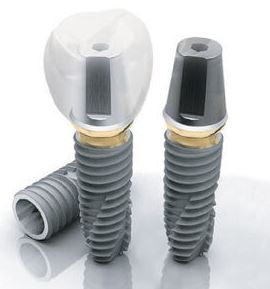A dental implant is an artificial titanium root that is placed in your jaw. It is made of the same surgical titanium as hip and knee replacements, and works by the same principles. Your bone grows into the surface of the implant, and locks it in place through a process called osseointegration. After about three months, the implant is integrated into the jaw, and is ready to be restored. There are three parts to the implant restoration:
- The implant itself (artificial root)
- The abutment, which attaches to the implant and looks similar to a tooth prepared for a crown.
- The crown, which is bonded to the abutment.





